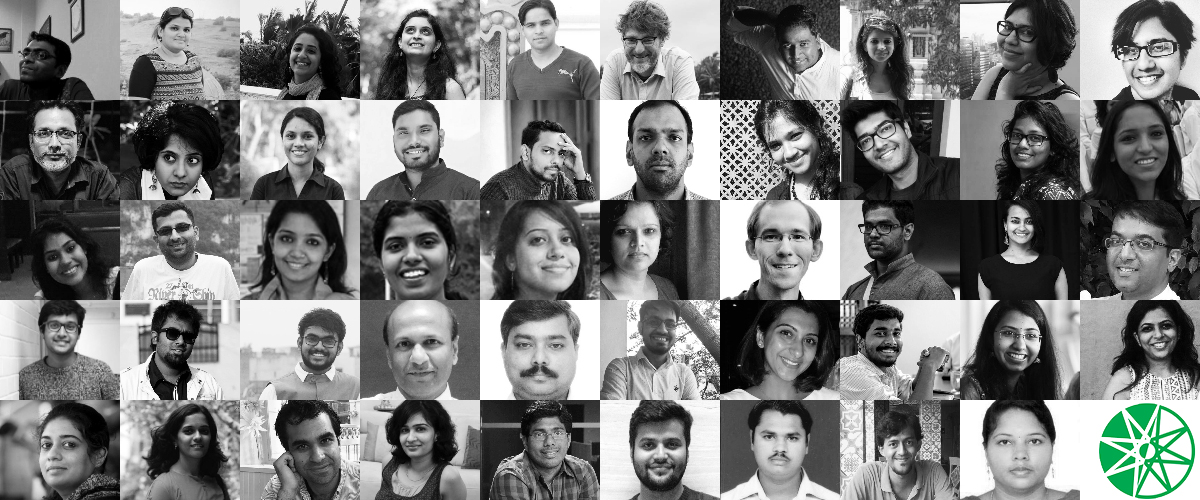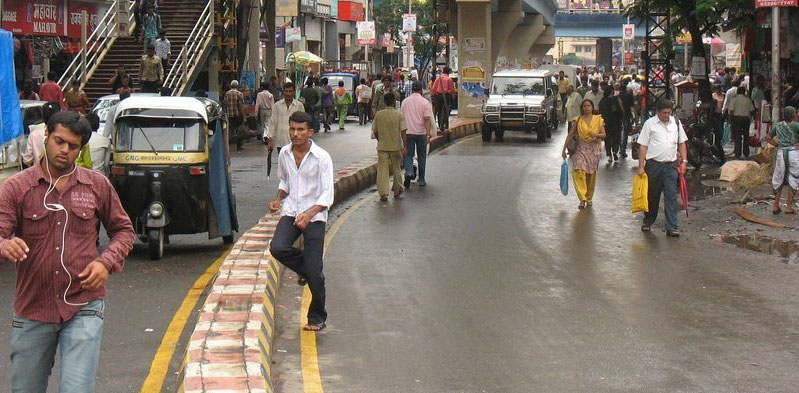It was back in 1998 that ITDP began its engagements in India, inspired by Mahatma Gandhi’s words, “Be the change that you wish to see in the world.” What started as one woman’s journey to change the dystopian path our cities were drifting towards has transformed into a formidable force of young, passionate visionaries who strive to bring back life in a place we call home. Today, ITDP celebrates two decades of action on the ground, catalysing tangible transformation at scale in over a third of urban India.
Transportation is the focus of many pressing issues facing the world today—decisions about whether to build highways or bus corridors have a great impact on our health and our planet. For this reason, ITDP has worked with over 18 Indian cities to reduce the human impact of transport choices: ensuring cities put people before cars, all citizens can walk and cycle safety, and jobs and services are a bus ride away. Through the dedicated efforts of our team and a strategic approach towards sustainable transport, ITDP India programme has impacted the lives of millions for the past 20 years.

The journey in India began in Agra. The vision to develop a modern cycle rickshaw to counter the growing threats of motor vehicular pollution, gave way to the India Cycle Rickshaw Improvement Project. What started off as five prototypes has become sustainably embedded as the standard design in cities across North India. Today, around half a million of these modern cycle rickshaws serve 4-5 million zero-carbon trips daily and offer dignified livelihood to over a million people, transforming the lives of their families as well.

ITDP realised the need to transform the quality and availability of public transport in Indian cities. Since 2003, the India Programme evangelised the idea of the Bus Rapid Transit (popularly known as BRT) to transform mediocre bus services into high-quality mass transit.
Ahmedabad, Gujarat’s largest city, welcomed ITDP to reimagine bus transit in 2005. Our partnership with Environment Planning Collaborative, and thereafter with CEPT University and the Ahmedabad Municipal Corporation resulted in the launch of Janmarg (in 2009)—India’s first high quality BRT system that expands to a network of 87 km. Janmarg has inspired many cities in India, and with guidance from ITDP, five cities have created 200 km of high-quality BRT to date.

In 2009, the India Programme revolutionised the way people perceived streets in India. Safe, child-friendly streets are not just a mirage of the past, but can be a beautiful reality even today. Ahmedabad was the first city in India to host Car-Free Sundays in collaboration with ITDP, Riverside School and other partners. The initiative allowed citizens to experience the freedom of walking and cycling on safer car-free streets. The success enabled expansion to Tamil Nadu and Maharashtra to raise awareness and transform their streets into places we all dream of everyday.
ITDP India Programme initiated collaboration with Chennai City Connect in 2009 to improve cycling and walking conditions across the city. Change isn’t easy in cities where the car is a symbol for status. But within five years of ITDP’s engagement with the city, Chennai took the bold move of adopting the Non Motorised Transport (NMT) Policy—first in India.
The policy mandates that a minimum of 60 percent of of transport funding to create and maintain walking and cycling infrastructure in the city. Having retrofitted over 50 km of walkable streets over the years, Chennai has initiated the next phase of redesigning an additional 50 km of street network. Chennai’s policy has inspired many national and international cities—from Chandigarh to Nairobi—to adopt similar policies. The comprehensive approach undertaken by Chennai, was awarded the Sustainia Award in 2015.

Since 2013, the India Programme has worked with the smaller cities of Tamil Nadu – Coimbatore, Trichy, Tirupur, Salem, and Madurai. In Coimbatore, the Namma Kovai Namakke (Our Coimbatore Ourselves) campaign, initiated by ITDP, sparked citizen demand for better pedestrian facilities. Coimbatore was the first city in Tamil Nadu to host Car-Free Sundays, that inspired Chennai and Madurai to do the same. The city also adopted The Coimbatore Street Design and Management Policy that aims to increase walking, cycling and public transport use. In light of Coimbatore’s vision to improve people-mobility, the city has planned a 30 km-network of walking and cycling paths to connect the city’s major lakes, in line with the guiding Policy.
The India programme began its engagements in Maharashtra in 2009, first with the Municipal Corporations of Pune and Pimpri-Chinchwad, and thereafter in Nashik and Aurangabad. Today, Pune is the epitome of a smart Indian city. Pune launched 40 kms of the Rainbow BRT in 2015, with an additional 45 km in the pipeline. The city adopted the Urban Street Design Guidelines and plans to redesign 100 km of streets based on the world-class standards set by the transformation of JM Road and DP Road pilot project.
While Pune has taken the first steps towards developing a people-centric city, the next challenge is to address the encroachment onto footpaths by parked vehicles. As a result, Pune adopted the Public Parking Policy to regulate parking, in 2018. The Policy aims to manage on-street parking through an efficient paid parking system but exempts bicycle parking from any charges. Pune realises that encouraging cycling reduces CO2, improves commuters’ health and increases retail visibility. As a result, the city plans to implement a dockless Public Bicycle Sharing system of 13,100 cycle, under the city’s Bicycle Plan. Yes, the city has worked wonders. Pune, Chennai, and Coimbatore – all cities ITDP assisted, were selected in the first round of the national government’s Smart City Mission.

In 2013, the India programme also expanded to Ranchi, the capital of the state of Jharkhand. Local conditions were unfavourable to support sustainable transport; thus, ITDP initiated collaboration with local civil society groups, educational institutions and trade associations that formed the Ranchi Mobility Partnership. Ranchi’s Mobility for All action plan prepared by ITDP, with input from the partners, provided a detailed roadmap of transport solutions for local conditions.
The action plan inspired the city to take responsibility of overseeing operations of 100 new buses, and an additional 300 buses in the due course—an applaudable move for a city that had fewer than 30 buses. The plan also identified a cycle network to improve access to public transport; as a result, the city is in the midst of constructing the state’s first Bicycle Sharing system comprising of 1200 cycles.
Onward and upward, Ranchi’s Parking Policy has inspired other cities in the state, like Jamshedpur, to manage on-street parking. The State too realised the chaos caused by unregulated parking and thereafter adopted the Jharkhand Parking Regulations—first in India. Jharkhand is also the first state to endorse the Transit Oriented Development Policy that was prepared in consultation with ITDP India.

On account of leveraging the sustainable transport agenda at the national level, the India expanded to the country’s capital, Delhi, in 2016. This gave rise to the policy brief on Women and Transport in collaboration with Safetipin and UN Women. Women represent the largest share of public transport users, yet they face many barriers that limit their mobility such as safety, comfort, convenience and affordability. Empowering women in transport enables them to participate in workforce, thereby creating a societal shift to transform the entire world economy.
The India Programme’s capacity development work, through training workshops and study tours, has been imperative to the success of its projects and policy. The India Programme has trained over 1000 government officials and other stakeholders. Over the years, our knowledge products have not only been used for best practise references, but also endorsed by the government – for example, the National Guidelines for Public Bicycle-sharing for the Ministry of Urban Development, and Street Design and BRT Guidelines for the Indian Roads Congress (IRC).

Since 1998, ITDPs’ agenda of improving the quality of life of citizens through equitable and sustainable transport has only magnified in momentum over time. Times have evolved, but our dream remains the same. Take a moment and imagine a 2050: will we design a future where we continue to get trapped in endless traffic while pollution destroys the city, and infrastructure fails to deliver? Or, will we live in ‘smart cities’ where people can zip around town, connected with walking and cycling boulevards and world-class rapid transit. The choice is yours; we chose the latter.
P.S. Dear Mahatma Gandhiji, we are being the change we wish to see in the world today. And, we have been doing it successfully for the past 20 years in India!









